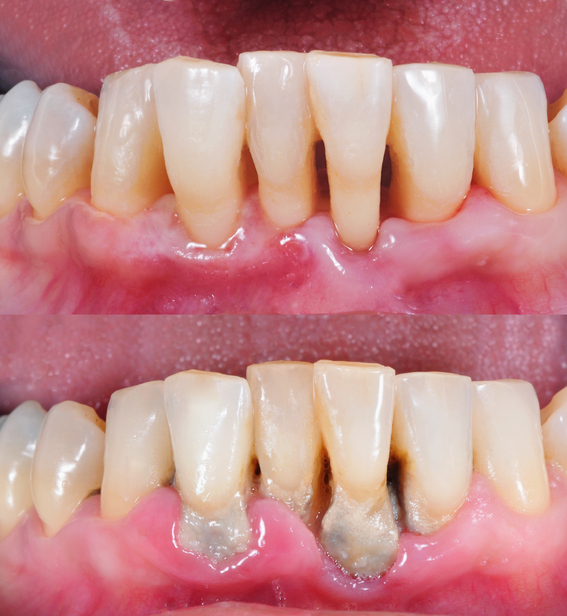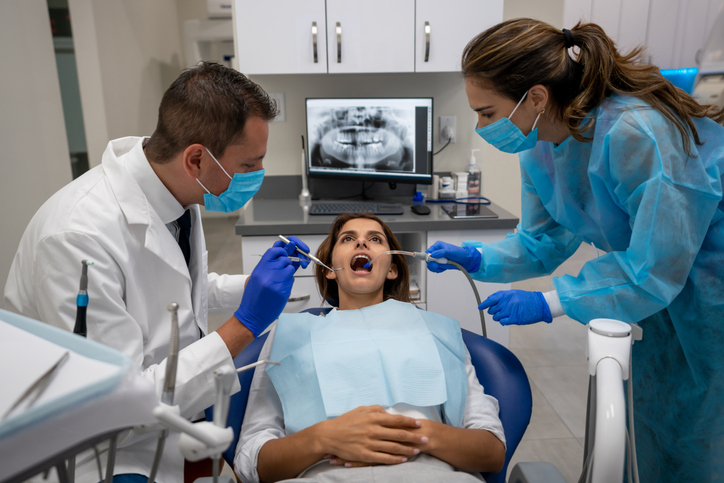Gum disease, otherwise known as periodontal disease, affects millions of people worldwide. This common bacterial infection can lead to serious health complications if left untreated. And unfortunately, due to the increase in sugar in Western diets, it affects more people each year.
To take control of your oral health and treat or prevent gum disease, it is essential to understand the causes, early symptoms, and prevention methods. In recent months, have you noticed any changes in your gum health? In this article, we’ll cover the information you need to make an informed choice about your dental health.

And if you ever have questions about what you can do for your oral health, don’t be afraid to contact us. For now, keep reading about preventing and treating gum disease!
What is Gum Disease?
To prevent and treat gum disease, first, you need to understand it! Gum disease is an infection of the gums and tissues that surround and support the teeth. There are two stages: gingivitis and periodontitis. Gingivitis is the early stage, characterized by inflamed gums, bleeding while brushing or flossing, and bad breath. If left untreated, gingivitis can progress to periodontitis, where the inner layer of the gum and bone pull away from the teeth. This creates pockets or bubbles that collect debris and bacteria, leading to tooth loss.
That sounds pretty awful, right? That’s why your dentist is always telling you to brush and floss! But sometimes even when we take the best possible care of our teeth, gum disease can occur. Let’s look into why in the next section!
Causes and Risk Factors of Periodontal Disease
Normally, poor oral hygiene is the primary cause of gum disease. When plaque builds up on teeth, it can harden and turn into tartar, which cannot be removed by brushing or flossing alone. However, certain factors increase a person’s risk.
These include:
- Smoking
- Hormonal change
- Medications
- Genetics
- Certain illnesses such as diabetes
As you can see, sometimes the development of periodontal disease is beyond your control! In other instances, stopping bad habits like smoking can drastically reduce your chances of developing this problem.
Now that you understand what causes periodontal disease, let’s take a look at how you can prevent and treat it!
Preventing and Treating Periodontal Disease
There are a couple of things you can do at home to prevent periodontal disease. And importantly, you can make sure to attend your regular cleaning appointments!
Preventative measures include:
- Brushing your teeth twice a day
- Flossing daily
- Using mouthwash
- Quitting smoking
- Maintaining a balanced diet
Regular dental checkups are essential in preventing gum disease, as your dentist can detect early signs of it and provide treatment before it progresses. Book your appointment here.

Young woman suffering from toothache
Dental treatments for gum disease depend on the severity of the infection. Treatments can range from a professional cleaning to surgical procedures such as gum grafting or bone regeneration. Your dentist will develop a treatment plan based on your specific needs.
Importance of Dental Treatments
Leaving periodontal disease untreated can lead to serious health complications, such as tooth loss, gum recession, and even heart disease. Research has also linked periodontal disease to an increased risk of stroke, diabetes, and respiratory disease. That’s why it’s important to be able to recognize the early symptoms and seek treatment!

If you’re ready to discuss your options, give us a call here.
Correct Gum Disease With Dawson Dental Hanover
Gum disease is a preventable and treatable condition, but it requires proper oral hygiene and regular dental checkups. If you suspect you have periodontal disease or have noticed any changes in your gums, schedule an appointment with Grundty Family Dentalcare. By taking care of your oral health, you are not only protecting your teeth and gums but also your overall health.
So, let’s get started together!
